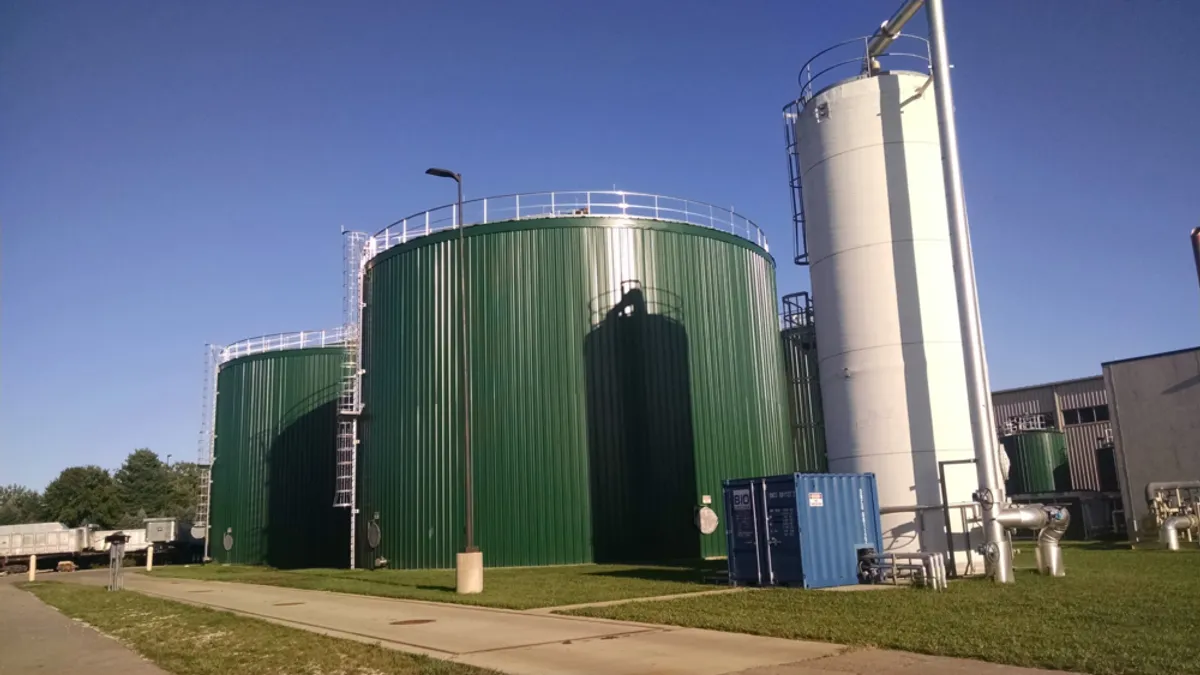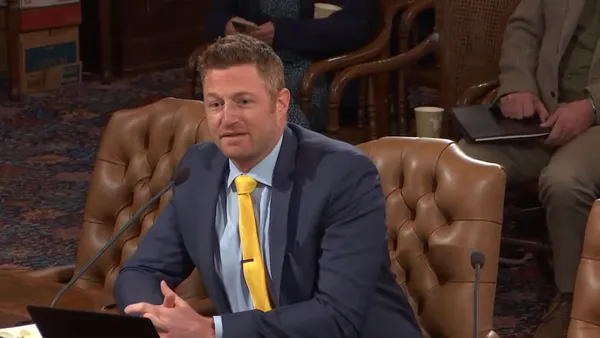Dive Brief:
- Generate Upcycle is threatening to shut down an anaerobic digester in Fremont, Michigan, by the end of the year over a permitting disagreement with the state’s Department of Environment, Great Lakes, and Energy. The company would lay off 17 workers and remove more than 150,000 tons of annual organics processing capacity from the state if it closed the site.
- Michigan’s EGLE is developing a groundwater permit process for the Fremont Regional Digestor’s digestate for the first time. At a press conference Thursday, Generate Upcycle President Bill Caesar said such a permit would require new controls that are cost prohibitive to the operation.
- The agency’s director, Phillip Roos, said in a letter to Caesar on Thursday that EGLE staff thinks the facility’s digestate may have become more liquid over time and doesn’t contain enough nutrients to qualify as fertilizer. He said the agency would continue to work with Upcycle on a path forward.
Dive Insight:
The Fremont Regional Digester has had a troubled history since it first came online in 2012. Originally financed by Novi Energy, the $22 million plant went into receivership after three years as the company failed to cover upfront costs, according to Crain’s Grand Rapids. Generate Capital, which owns Upcycle, acquired the plant in 2017 and brought it back online.
The plant has produced biogas and liquid and solid fertilizers under Upcycle’s direction. It generates 2.85 MW of electricity annually, taking in “farm, animal, food processing, and consumer food waste,” according to its website.
Caesar said the plant was initially regulated by the Michigan Department of Agriculture & Rural Development, and it has continued to receive support from the state agency — earlier this year, Generate Upcycle received a grant from MDARD that the company said it would use to construct a free food waste drop-off location for residents at the Fremont facility.
On Thursday, Caesar said Upcycle had also worked effectively with EGLE for several years after it began operating the Fremont Regional Digester. But as a result of the increased scrutiny, he called for the primary regulator of the facility to be MDARD, rather than EGLE’s Water Resources Division, claiming, “There is no record that any digestate that we have applied has ever affected groundwater.”
But Roos said in his letter that the product coming from the Fremont Regional Digester did not contain enough nutrients to be classified as a commercial fertilizer as the company had requested, and that it instead must be regulated for its liquid components.
EGLE has offered to extend the facility’s current permit until March or potentially later on a temporary basis as it works to finalize new permit requirements. But Caesar said he didn’t want to build up digestate only to be denied the ability to land apply it in the new year.
The state first began the new permit process in December 2021, Caesar said. According to the agency’s letter, EGLE staff began to scrutinize the Fremont facility more closely in part because of odor and runoff complaints from nearby residents. Caesar said that Upcycle had addressed those complaints by investing about $1 million to build lagoons. But those, too, drew scrutiny from EGLE and led it to believe that the digestate from Fremont has become more liquid over time.
Roos acknowledged in the letter that the agency is still trying to understand the facility’s regulatory history. He noted that the “decisions made by the previous administration on the applicability of the [facility’s previous agricultural use permit] were likely based on different digestate characteristics than the digestate the facility produces today.” Michigan Gov. Gretchen Whitmer took office in 2019.
The letter also noted the Fremont facility is “not currently profitable and has been operating a deficit since Generate acquired the property.” Roos expressed a commitment to working with Upcycle to find a way for the facility to be successful, but said “we cannot compromise legally required and necessary environmental and public protections.”
Caesar denied that the feedstock or Fremont's resulting digestate has changed in consistency over time. He said in addition to the impact on Upcycle, the enhanced regulations would be a loss to farmers who use the facility’s products.
“Farmers who choose to use our liquid fertilizer on their fields would lose their ability to make their own agronomic decisions,” Caesar said. “Those farmers who elect to use our digestate, a sustainable, organic fertilizer ... will essentially be penalized by the state of Michigan.”
The state’s climate plan set a goal to cut food waste in half by 2030, echoing national and international goals that have been set by other public and private stakeholders. Michigan is also now on a path to achieve 100% clean energy by 2040 following a suite of bills signed into law by the governor earlier this week.
Caesar cited that legislative package, which included a clean energy bill that supports the use of methane digesters, when noting what would be lost with the facility’s closure.
“The Fremont Regional Digester plays a critical role in helping Michigan meet the climate goals that the governor just signed into law this week, but it’s also a critical piece of the economy and supports local communities,” Caesar said.
The Fremont Regional Digester plans to stop accepting food waste on Dec. 29, Upcycle announced. Caesar said he hoped to come to a resolution with regulators that would allow the company to continue operating the plant. In addition to the Fremont facility, the company also owns anaerobic digestors in New York and Ontario.















